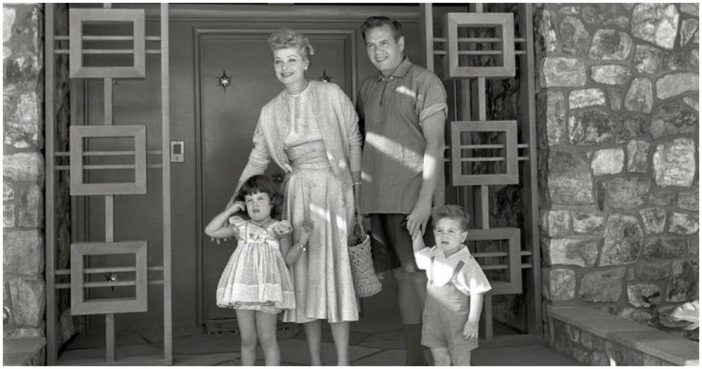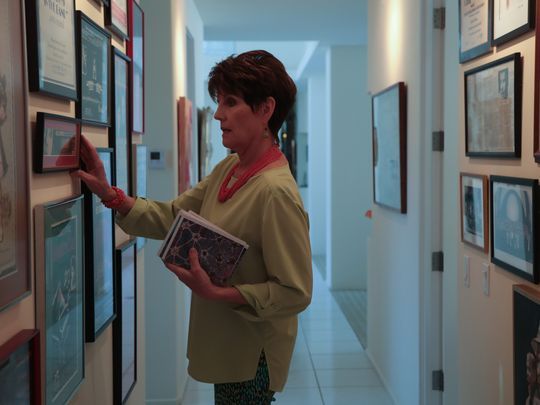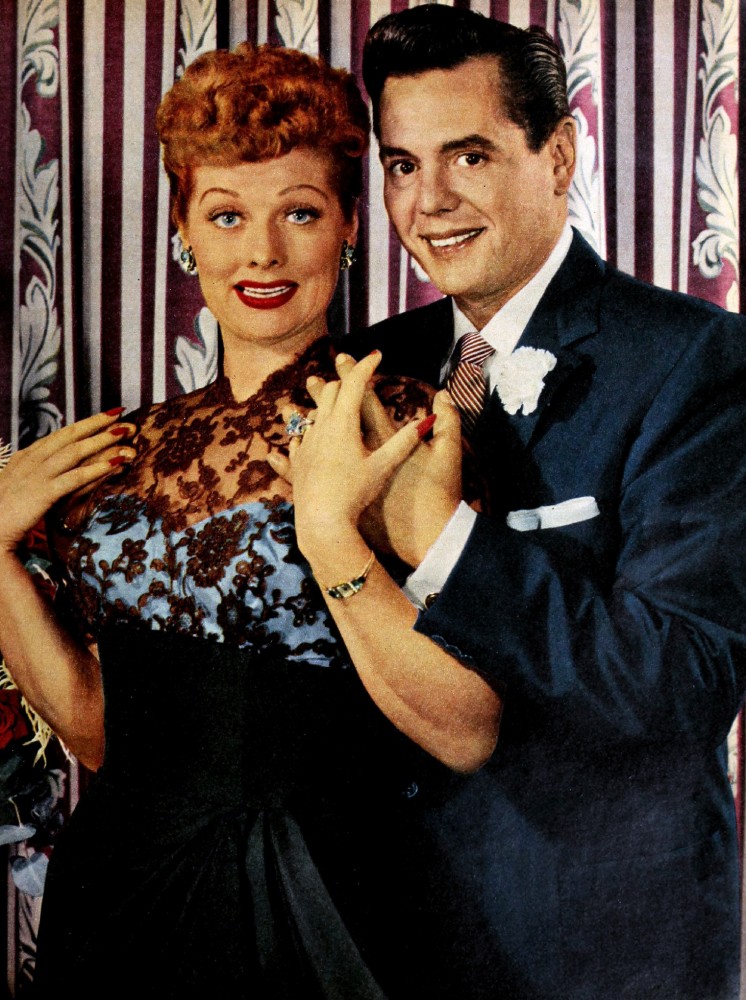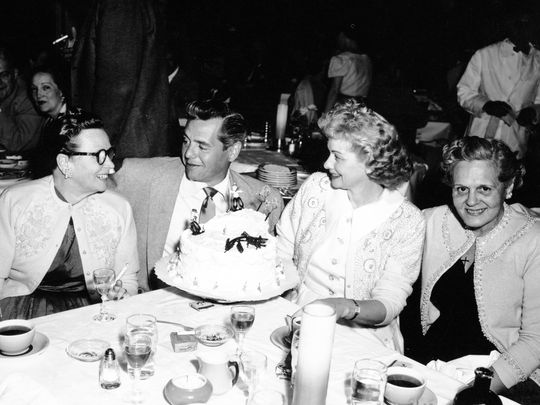
The family was a priority to Lucy and Desi, too, said Lucie. But their careers got in the way.
“They were dying to have a family as soon as they got married,” she said. “He had a band and bands travel. She was in movies and then on radio, so they were separated a lot and then she had two miscarriages. It took them 10 years to have me, and I think the only reason that happened was, she said, ‘You have to stay home for a while. Maybe I can put you on this new show we’re doing on television.’ And that’s how that happened.”
Lucie Arnaz adjusts a poster hanging in the hallway of her home in Palm Springs, Calif., March 7, 2018.

Lucy, who was seven years older than Desi, also had her share of childhood trauma. Her father died when she was 4 and she had to live with her grandparents while her mother worked. She loved her grandfather, but he was involved in a shooting accident that left a child paralyzed, and he lost his property in a legal judgment. Then Lucy’s mother re-married a man who didn’t want kids and Lucy wound up living with his mother, a Puritanical woman who didn’t approve of her interest in dance. She eventually moved to New York to pursue acting and modeling.
“It was just one disaster after another growing up,” Lucie said of her mom. “They didn’t have money and then they had really no money, so she escaped, basically, to try to make a life for herself.
“My father was forced into that same thing – from having everything to having nothing because of the revolution. So, they came from a similar disaster basis and they took care of their families. Then, when they met each other, it was like, ‘Oh good, someone can finally take care of me.’ But when you both feel that way, it doesn’t happen. They never really got a chance to look back and mourn for the pain they had to go through. They just went through it.”
Lucy’s 1948 radio show, “My Favorite Husband,” about a banker and his wacky wife, became popular enough to be developed into a TV series by CBS. Lucy insisted on Desi playing her husband, but there was such resistance to the idea of an Anglo woman being married to a Cuban that Lucy and Desi had to take the show on the road and prove to vaudeville audiences that America could accept a mixed marriage.
When they began filming “I Love Lucy” before a live audience, to take advantage of Lucy’s live comedy skills, she was pregnant with Lucie.
“She always said having a family was the best thing that ever happened to her,” said Lucie, “but, it collided with the ‘I Love Lucy’ show. Having me six weeks before she went to work on ‘I Love Lucy,’ they thought, ‘We’ll do this for a year and we’ll have home movies for our kids.’ And it became the biggest thing ever. So, it was one of those things, ‘Be careful what you wish for.’ It was almost impossible to be with the family you said you wanted to have all your life.”
Lucille Ball and Desi Arnaz, during the run of “I Love Lucy.”

Lucie grew up with an affinity for acting and put on plays in her garage. Her brother, Desi Jr., grew up with a talent for drums and wound up in a rock band with Dean Martin’s son, called Dino, Desi & Billy. But, Lucie doesn’t recall who coached her back then.
“My dad was almost never up there when we were doing those shows,” she said. “It was probably always my mother. But, she didn’t give me input. I have no memory of her ever coming in and saying, ‘Do it this way.’ I only have memories of, ‘Oh my God, that was great’ and ‘Let’s invite people to see it.’ It was always extremely encouraging, like ‘Keep on doing what you’re doing.’ I love that. Most parents don’t do that for their kids.”
Stories of Desi’s drinking, gambling and womanizing are legion, but Lucie said it was her father who wanted to keep their television business small to have time to enjoy their family. Lucy, she said, wanted to become an institution.
“They had their own little production company, but they were getting involved in helping other people produce their shows,” Lucie said. “It came down to, ‘Look, Honey, we’re not selling our shows because the big studios have more clout and they spend more money to promote. So, if we want to be this production company, we have to get bigger or go home. We buy RKO, which is for sale, and get bigger and we give those big studios a run for their money. Or, we go home and spend time with our family. I don’t think we need to get any bigger. We made all the money we could ever use in our lives. Let’s just cash in the chips now, go home. We’ll do a special every now and then, and we’ll get to fish and ride horses.’
“And, faced with that choice, my mother said, ‘I don’t want to quit. I want to keep going.’ She chose to buy the studio. It was her choice to get bigger. He was saying he wanted to get back to the roots. He wanted to go back and have life happen again.”
Lucie says that’s what “Lucy and Desi” must be about. Fortunately, the producers who came to her and Desi Jr., Todd Black, and Jenna Block of Escape Artist Productions, wanted that, too.
Desi Arnaz and Lucille Ball, flanked by their mothers, are seen at Desi’s birthday party in Palm Springs in 1951, the year Lucie Arnaz was born.

“I didn’t come to them and say, ‘Let’s do a love story on my folks,’” Lucie said. “The last thing on my brain is to try to re-create those people. But, they presented it in such a wonderful, positive, optimistic way. They said, ‘Look, this is a complicated story. They got divorced. Everybody knows that. There were lots of problems. But, we believe this was one of the great love stories ever.’ I said, ‘Yes, it’s very difficult and if you want to do sensationalism, I think a lot of people are going to be disappointed because they want their ‘I Love Lucy.’ If you’re going to talk about the alcoholism and the dames, all of a sudden you’re going to look at ‘I Love Lucy’ differently and you’re not going to have the joy. Be careful of that. It’s fragile and it’s perfect, and you don’t want to screw with that.’”
The producers haven’t found an actor to play Desi, but Blanchett committed more than a year-and-a-half ago and Lucie met her in New York.
“Her first instinct was not about the comedy,” Lucie said. “It wasn’t about trying to do (classic sketches like) Vitameatavegamin or the Chocolate Factory. It was, ‘It must have been holy hell to try to keep a marriage together and a family and have the kind of success she had.’ I said, ‘Thank you very much,’ and, ‘We’re done.’ That’s all I needed to hear.”
She hasn’t seen what Sorkin may be writing, but she’s confident he’ll write sympathetically about her parents’ shortcomings and their lasting impacts.
“Aaron Sorkin writes that better than almost anyone I know,” she said. “He can get into the head of a character and show you the demons and make you love that person and pull for that person. It’s not a tribute. It’s not a trash piece, just like I hope my documentary, ‘Desi and Lucy A Home Movie’ was not. I tried to walk a very fine line between two tortured people who had it all and lost it in a minute because they somehow couldn’t accept themselves.
“So, we’ll see. I’m excited and I’m terrified to go to work and do this. But, I’m trusting the masters to help me along.”
Credits: desertsun.com
